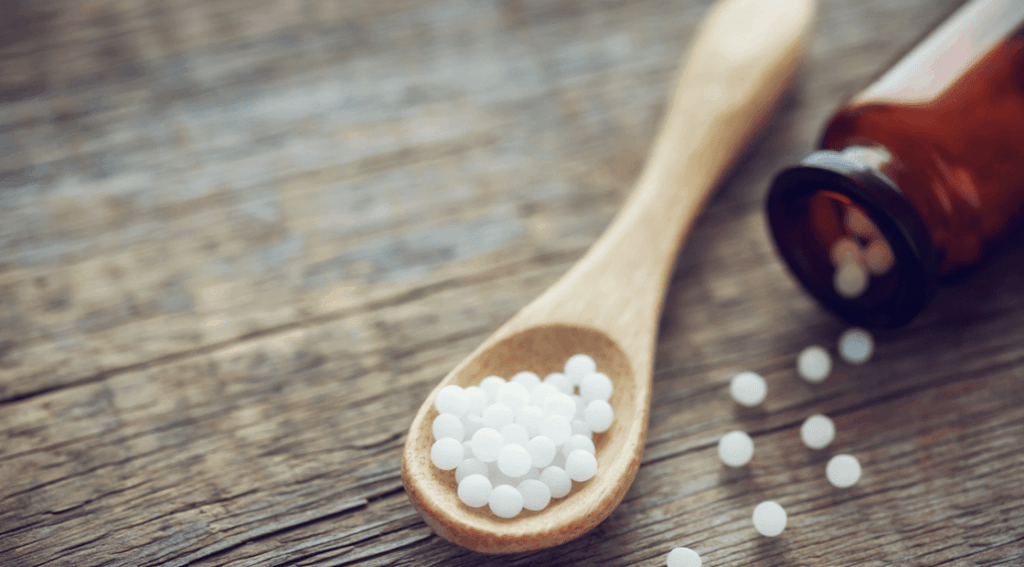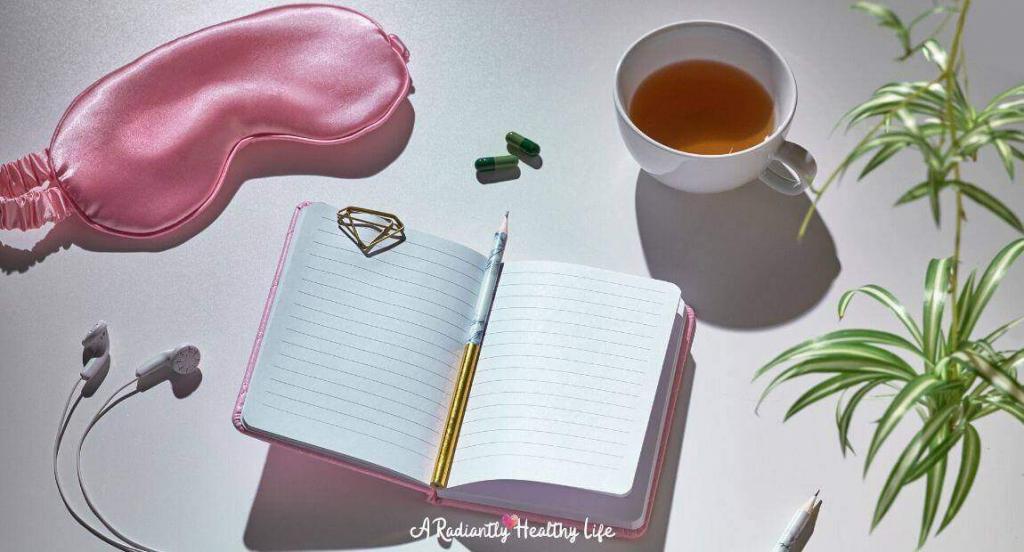If you’re having trouble sleeping, chances are you’re here looking for the most effective natural sleep aid that can help you get a good night’s sleep. These 18 natural insomnia remedies (and essential tips) can help you ease insomnia so you can get the sleep you need to function well and live your best life!

This post may contain affiliate links, which means I’ll receive a commission if you purchase through my links, at no extra cost to you. Please read full disclosure for more information.
18 Natural Insomnia Remedies
Usually, I start posts with an explanation or more of an introduction, but as a fellow insomniac and overall poor sleeper, I know exactly what it’s like to want to cut to the chase and just get the info you really need.
So to do that, I am going to share natural sleep aids first.
If you want to read about causes of insomnia, different therapies that can help, or self-care ideas that can reduce stress and help you get a peaceful night’s sleep, be sure to read the sections following.
After all, natural remedies alone probably aren’t going to cure the sleepless nights that you’re experiencing (although they can absolutely ease insomnia), for most people it takes a whole body/mind approach.
So, if you have time be sure to check out the rest of the info 🙂
Ok, on to those effective natural remedies for sleep!
Best Herbs For Insomnia

There are many herbs, homeopathic remedies, and essential oils that are known to be natural insomnia remedies but these are a few that I have personally found helpful 🙂
Chamomile
This herb is a great remedy that has been used for thousands of years! But not only does it have the benefit of being an effective folk remedy, but it has also actually been studied and was found to be a mild sedative and sleep-inducing.
Hops
Even though hops are used to make beer, that’s not what we’re talking about here :D. Hops are actually a quick-acting remedy that can help you get to sleep and have restful sleep.
Lavender
This herb comes in many forms such as tea, an essential oil, and supplement, and is probably one of the most well-known natural remedies. This fantastic plant is used by many to reduce anxiety, improve mood, induce sleep and relaxation, relieve pain, and even reduce nausea.
Lemon Balm
This minty herb is gentle enough for kids but works just as well for adults. If you’ve had an exhausting day, feel overstimulated, and need to unwind, this delicious herb is perfect. Take as a liquid supplement or make a nice cup of tea and drift off to sleep.
Valerian
Compared to a few of the other herbs, Valerian can be a little slower to work, but if you deal with tension, fatigue, or headaches, definitely consider adding this remedy to your daily routine!
Homeopathic Remedies For Stress & Insomnia

Homeopathic remedies are amazing! They have been used successfully for hundreds of years, have been shown to be effective with acute and chronic health issues, and are very cost-effective!
To find the best homeopathic remedy for your personal situation, choose the remedy that best describes your symptoms.
If you have chronic health issues or do not see improvement from your selected remedies, consider making an appointment with a professional homeopath.
On to common remedies for insomnia!
Aconite
If you feel panic, restlessness, or your heart is beating fast, think Aconite! Do you find yourself feeling panic when drifting off to sleep or upon waking? Try this remedy.
Coffea Cruda
This remedy can help if your brain is on overdrive and your thoughts are racing. Whether you’re worried or excited, Coffea Cruda can help your brain relax, calm over sensitivity, and help you relax so you can get the sleep you need.
Chamomilla
If you feel irritable and this feeling is preventing you from relaxing and getting a good night’s rest, think of Chamomilla. This remedy can help irritable kids too!
Arnica Montana
Do you have aches or pains that keep you awake? Maybe your bed feels too hard and you can’t get comfortable enough to fall asleep? Arnica Montana is a great remedy to help ease that sore, achy feeling.
Ignatia Amara
If grief, worry, or emotional stress is causing hypersensitivity and distraction (watching your favorite tv show, calling a friend, etc) seems to help for a short time, reach for Ignatia Amara.
A few other remedies that can help with poor sleep or insomnia would be Arsenicum Album, Gelsemium Sempervirens, Kali Phosphoricum, and Nux Vomica.
*I am not a doctor and can’t prescribe in any way, but I can tell you that I personally usually buy remedies in 30C potency, but there are times when 200C is a better choice. No matter which you choose, be sure to follow the directions on the label or the advice of your homeopath or health care provider 🙂
Interested in learning more about homeopathic remedies and how you can use them for almost any health issue?
Check out a few of my favorite books that can help you get started!
Essential Oils For Insomnia

Getting restful, restorative sleep is essential to regaining energy, reducing stress, and restoring health. If you are dealing with adrenal fatigue, an autoimmune disease, or another health issue, sleep is not only important but essential!!
Choose any of the essential oils below and you’re sure to have better sleep!
Roman Chamomile
Roman Chamomile essential oil has powerful calming properties. It is also known to help reduce anxiety, promote better sleep and reduce nightmares!
Mandarin
Mandarin oil is great for relieving nervous tension and soothing the mind and body. It has also been reported that this oil can help calm feelings of upset or oversensitivity.
Vanilla
Vanilla oil not only makes your home smell amazing, but it is also great for relieving tension and is said to be slightly sedative which can help you drift off into a relaxing sleep.
Ylang-Ylang
Ylang-Ylang, much like vanilla is said to have a somewhat sedative effect which can help calm the mind, reduce anxiety and tension, and help you fall asleep faster.
Interested in essential oil blends that smell great and work wonderfully?
This Sleep Aid blend, as well as Sleep Tight, are both great options!
Home Remedies To Help You Fall Asleep Quickly
Just in case you wanted a few more natural remedies to add to your natural medicine cabinet, here are a few home remedies to help you fall asleep quickly!
Banana Peel Tea
Don’t throw out those banana peels, you need them to make banana peel tea! When boiled, banana peels are actually one of the great natural insomnia remedies! It seems weird, but banana peels have amino acids, minerals, and vitamins that are great for promoting peaceful sleep.
Warm Milk
This is an old traditional remedy that some say has no scientific basis, but others swear by it.
If drinking warm milk sounds soothing to you, there is always the option of adding milk to banana peel tea, or adding ingredients like turmeric, tart cherries, lavender, or raw honey, all of which have been shown to aid in relaxation, reduction of inflammation, or natural melatonin production!
Now that we’ve gone over a few natural remedies that could help you get a good night’s sleep, let’s go over some causes of insomnia and self-care tips that are really essential!
Self-Care Tips For A Better Night’s Sleep
Did you know that researchers have found that many with depression also have insomnia or other sleep issues? It’s true!
If you don’t get a good night’s sleep you won’t be able to function well mentally or physically.
In fact, getting enough good quality sleep has been associated with reduced rates of depression and anxiety, better brain function, a healthier immune system, and better overall health!
So, in addition to supplements to help ease sleep problems, be sure to check out these self-care tips and see if any would be appropriate for you to add to your daily routine.
Add Sunshine Or Light Therapy
When your body is exposed to sunlight in the morning (and throughout the day) it tells your glands that it is time to be awake. These glands then reduce the sleep hormones and increase hormones that help you get up and ready for your day.
Basically, getting enough sun helps your body’s internal clock decide if it’s time to be awake and active or feel sleepy and start to wind down for the day.
A nice walk in the sun or even having coffee on the deck is a great way to start your day!
If you live in a place that doesn’t have a lot of sunshine for many months you can also use a sun lamp and try a little light therapy while you have your coffee, read your emails, or even while you work.
Add Movement And Exercise
We’ve all heard that regular exercise is good for you and offers many health benefits, and good sleep is on that list of benefits!
There has actually been quite a bit of research done on the topic of exercise and sleep. Here is one study that showed those who get an hour of exercise 5 days per week had much more normal REM sleep compared to people who didn’t exercise.
You don’t have to get 60 minutes each day to see benefits from exercise though, even 30 minutes most days a week can help lessen depression, lower blood pressure, reduce stress and anxiety, and so much more!
And all of those conditions can be contributors to poor sleep.
So, tomorrow, if you’re able, be sure to add some movement and exercise to your day!
Eat For Sleep
It might seem a little strange, but what you eat and drink can have a real effect on your sleep.
A few foods are actually known to have properties that can help you feel sleepy.
Here are a few food items you may want to include in your last meal of the day:
- Bananas
- Cherries
- Cheese
- Almonds
- Milk
On the flip side, there are foods that can contribute to poor sleep as well.
Here are a few foods (and drinks) to steer clear of before bed:
- Coffee (or any drink with caffeine)
- Spicy foods
- Fatty foods
- Alcohol
Take Steps To Manage And Reduce Stress
If you find yourself lying in bed with your mind racing like a hamster on a wheel, you’re not alone. At one time or another, we have all had something stressful that has kept us awake.
But if you feel that way on a regular basis it is definitely going to negatively affect your sleep.
That’s why taking steps to manage and reduce stress is one of the best natural insomnia remedies!
Not sure where or how to start reducing your stress levels so you can get better sleep?
There are a lot of easy and effective ways to reduce stress naturally.
Here are a few of my favorites:
- EFT (Emotional Freedom Technique)
- Meditation/Prayer
- Journaling
- Yoga
- Reading before bed (here are a few books to check out!)
- A nice warm bath or shower
Really, anything you find calming and relaxing will help you to wind down and be in a better frame of mind for sleep.
Create A Sleep Friendly Environment
Creating a cozy space and implementing a bedtime routine isn’t just for kids, adults need it too!
So, in addition to getting sunlight, exercise, and eating the right foods, consider a few of these sleep-friendly lifestyle tips:
- Turn off electronics at least an hour before bedtime (and don’t take your phone to bed with you!)
- Make sure your bedroom is cool and dark
- Reduce noise by using a fan or noise machine
- Take a relaxing bath or shower before bed instead of in the morning
- Choose comfy bedding
- Make sure your mattress is in good shape, supportive, and feels comfortable
- Go to bed at the same time each night (if possible)
Helpful Therapies For Insomnia
If you find that implementing some self-care practices and natural insomnia remedies are not working for you, it may be time to seek some professional help to reduce stress or get to the root problem.
A great doctor can be a real help if you’re struggling and need some guidance or assistance. The trick is to find one that does more than just prescribe medication.
For best outcomes, my suggestion is to look for a doctor that looks at the body and mind holistically.
If you’re looking for an integrative practitioner or a doctor that practices functional medicine, you can check out this directory and find some in your area.
As for certain therapies that may help, here are a few that are commonly used with success if you are dealing with severe or chronic insomnia:
- Relaxation training
- Cognitive-behavioral therapy
- Stimulus control
If you have tried natural insomnia remedies and feel like you need more help, there is no shame! Seek out the assistance of a functional medicine doctor or holistically-minded therapist so you can get to the bottom of what is going on and take the necessary steps to fix it once and for all!
FAQs
I’m no expert but since I have dealt with insomnia for quite a long time, I have had friends and family ask different questions over the years, either because they are curious or because they too have had a time of poor sleep and were looking for advice.
Here are a few questions they have asked, maybe you can find a helpful answer if you’re asking some of the same 🙂
1. What is insomnia?
According to the National Sleep Foundation, insomnia is defined as:
“difficulty falling asleep or staying asleep, even when a person has the chance to do so. People with insomnia can feel dissatisfied with their sleep and usually experience one or more of the following symptoms: fatigue, low energy, difficulty concentrating, mood disturbances, and decreased performance in work or at school.”
The National Sleep Foundation
2. What causes insomnia or poor sleep?
Insomnia can have a number of causes. Stress is one of the most noted reasons people experience sleeplessness, but certain mental or physical health issues, medications, working night shifts, eating or drinking stimulating foods, or even pain can cause you to lose sleep.
3. Can insomnia be cured?
Insomnia can be cured in many cases or at least well managed. It really depends on getting to the root cause and finding the therapies that work best for you and your specific situation.
4. Are there medications for insomnia?
There are medications for insomnia but please do some research, use caution, and consider the side effects carefully before choosing this route. These prescriptions often come with unpleasant or disturbing side effects like headaches, dizziness, sleepwalking, diarrhea, dry mouth, depression, slow breathing rate, and many others.
In many cases, natural remedies for insomnia, therapy, and lifestyle changes can eliminate or greatly reduce the severity and duration of insomnia without additional negative side effects.
A Few Last Thoughts On Natural Insomnia Remedies
Insomnia can be difficult to deal with, especially if it becomes chronic, but thankfully, there are natural remedies and therapies available that can really help!
If you are finding it hard to get a good night’s sleep I encourage you to consider the root cause, try the natural remedies that you feel could be helpful, and don’t hesitate to seek out the help of a holistic health care provider if you need it!
Good sleep is essential for overall health and well-being and you deserve to feel good and have a radiantly healthy life!
Resources
https://www.ncbi.nlm.nih.gov/pmc/articles/PMC5385214/
https://www.ncbi.nlm.nih.gov/pmc/articles/PMC2995283/
https://www.sleepfoundation.org/insomnia/treatment
https://www.ifm.org/
https://www.sleepfoundation.org/insomnia/what-insomnia






